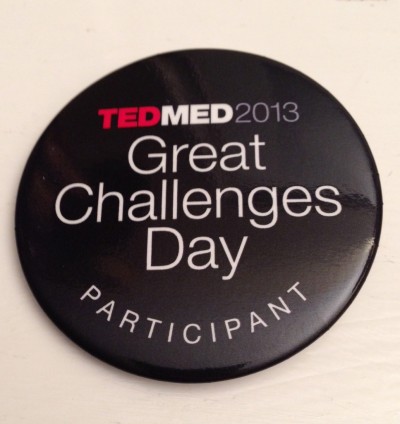The American healthcare system could be headed for a perfect storm, says one expert. And that’s a good thing.

Regular readers of Eclectablog know that healthcare is something I write about often. In fact, I’ve been writing about it for more than a decade, long before I became a contributor here.
Particularly with the passage of the Affordable Care Act (aka Obamacare), I’ve seen the opportunity to vastly improve the ways people receive care. Giving people access to routine preventive care, including the expansion of Medicaid to insure millions of low-income Americans nationwide — nearly half a million just in Michigan — is only one facet of the potential that exists.
I’m not alone in this belief. For years, countless experts have been studying ways to create healthier communities. I had the good fortune to be a delegate at TEDMED earlier this year, a conference dedicated to creating unexpected connections that illuminate and spark innovations in health and medicine. There, I gained an even deeper appreciation for the value of a more holistic approach to wellness.
 It’s also how I came to be asked to moderate a Google+ Hangout for TEDMED’s Great Challenges Program. According to TEDMED, “the Great Challenges of Health and Medicine are complex, persistent problems that have medical and non-medical causes, impact millions of lives, and affect the well-being of all of America — beginning with patients, and extending to families and citizens everywhere.” Great Challenges was part of TEDMED 2013 and has an active online community where these topics are discussed.
It’s also how I came to be asked to moderate a Google+ Hangout for TEDMED’s Great Challenges Program. According to TEDMED, “the Great Challenges of Health and Medicine are complex, persistent problems that have medical and non-medical causes, impact millions of lives, and affect the well-being of all of America — beginning with patients, and extending to families and citizens everywhere.” Great Challenges was part of TEDMED 2013 and has an active online community where these topics are discussed.
On Thursday, September 12 at 2 p.m. ET, I’ll be moderating a panel discussion of the topic “Where Health Begins: Social Determinants of Health.” To prepare for the chat, I spoke with Mindy McGrath, director of Government Relations with the Association of Academic Health Centers. (AAHC). The AAHC has been collaborating with its member institutions to develop ways to be more involved in their local communities. The goal, she says, is to influence the factors they know impact 75 to 80 percent of health outcomes.
There’s a pretty solid base of research that shows that things like education, socio-economic status, housing, access to healthy foods, the walkability of the neighborhood you live in — all those elements of everyday life have a significant impact on your health. Social determinants of health is how we, as health providers, talk about those things that, for a long time, have been seen as outside our control. But if our goal is to improve health, then what we do in a medical office is only part of the way we can achieve our mission.
For example, McGrath says, asthma rates tend to be higher in urban communities because of the prevalence of cockroaches. Illiteracy is also a problem. After all, how can someone comply with their prescribed healthcare regimen if they can’t read a prescription bottle or doctor’s instructions? That’s why one academic health center in Montana is running reading proficiency programs they think will lead to higher health literacy.
Through meetings and brainstorming sessions, member institutions of the AAHC are developing strategies and resources to influence the social determinants of health. One resource they’ve created so far is an online toolkit for collaboration and sharing of best practices related to social determinants of health.
This is only the beginning — and the AAHC is only one of the many organizations working toward similar goals. McGrath sees evidence of new approaches to care developing across the U.S. healthcare system.
We’re starting to feel like there are a lot of different movements converging right now. There’s the Affordable Care Act. There’s also a strong movement now toward interdisciplinary team care and social determinants — what we hope will be a perfect storm, a re-envisioning of how we deliver care, how we look at each patient as an individual, and how we help patients be as healthy as they can be.
A panel of experts, including McGrath, will weigh in on this topic during the online chat on September 12 at 2 p.m. ET. Anyone is welcome to join the Google+ Hangout, ask questions or follow the conversation on Twitter using #GreatChallenges.
[Photos: Top image courtesy of TEDMED. Button photo by Amy Lynn Smith.]



